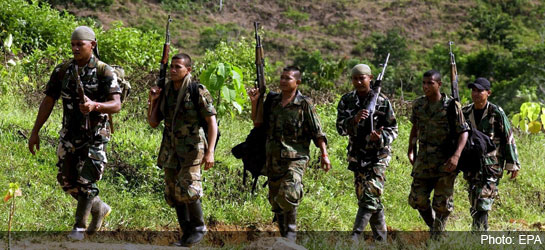
Colombian security officials express their concern over the growth of emerging criminal gangs, which police chief Oscar Naranjo called the biggest threat to security.
Organizations such as the U.N. High Commissioner of Human Rights and NGO Human Rights Watch have warned that the rise of these groups, which they government terms “Emerging Criminal Groups” (BACRIM), is linked to the demobilization of paramilitary umbrella group the United Self Defense Forces of Colombia (AUC).
The officials discussed measures to combat this new type of criminal organization. They stated that they are particularly concerned by the fact that the new gangs lack any political ideology, and their only goal is to make money by trafficking drugs.
Because of this lack of political sentiment, the relationship between these drug gangs, drug lords, and the FARC is growing stronger, said Rivera.
“To award the name of paramilitary drug trafficker is a mistake because it gives them [drug gangs] the political status they yearn for to escape the actions of the authorities and presses a political negotiation that exempts them from their responsibilities,” Naranjo said, reported RCN.
Defense Minister Rivera said that the authorities should not only capture the leaders of the gangs but also attack the structure by disrupting their support networks, logistics and assets.
Neo-paramilitary groups such as “Los Urabeños,” “Los Paisas,” “Aguilas Negras” and drug gangs like “Los Rastrojos” have been the cause of 14 massacres in 2010 reported Spanish news agency EFE.
According to the NGO CODHES, the northern department of Cordoba experienced over 600 murders in 2010 and 45 this year alone. Control of the department’s Caribbean region is highly contested by gangs seeking to export drugs.
Interior and Justice Minister German Vargas Lleras recently said that criminal gangs like the Rastrojos are a “new enemy” of the Colombian authorities

